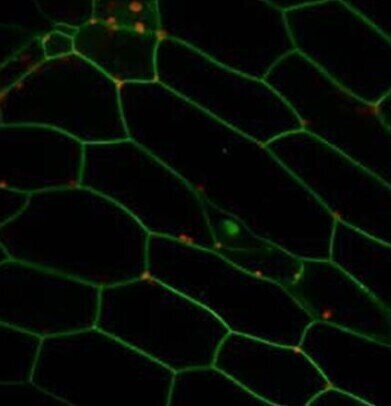-
 Pic 1. Plant membrane proteins anchored at the plasma membrane (Credit: Dr John Runions, Oxford Brookes University)
Pic 1. Plant membrane proteins anchored at the plasma membrane (Credit: Dr John Runions, Oxford Brookes University) -
 Pic 2. OCTOPUS reveal discrete single molecules in plant. Small particles are observed with a totalinternal reflection fluorescence microscope (TIRFM) - invisible with standard confocal microscopy. (Credit: Dr John Runions, Oxford Brookes University)
Pic 2. OCTOPUS reveal discrete single molecules in plant. Small particles are observed with a totalinternal reflection fluorescence microscope (TIRFM) - invisible with standard confocal microscopy. (Credit: Dr John Runions, Oxford Brookes University)
News
Further insight into plant defence mechanisms
Aug 10 2012
A breakthrough discovery that has shown how plants may defend themselves in the face of pathogen attacks could hold the key to making crops more disease-resistant and to boosting food production to help global food security.
As part of a BBSRC-funded project led by Oxford Brookes University, scientists at the OCTOPUS (Optics Clustered to OutPut Unique Solutions) imaging facilitie-, part of STFC’s Central Laser Facility’s Lasers for Science division at Harwell - developed a single-molecule tracking technique which revealed, through real-time observation, why certain proteins in plant cells don’t move around as much as their counterparts in animal cells.
This technique, complemented by the use of total internal reflection fluorescence (TIRF) microscopy revealed that the cell wall plays a crucial role in limiting the mobility of proteins produced when a plant comes under attack. Specifically, it has shown that the cell wall allows these proteins to stabilise in the plasma membrane (a ‘skin’ covering the inside of the cell wall). This restricts their ability to move around and fight invading pathogens and so increases the plant’s vulnerability.
Dr Stan Botchway from the Lasers for Science division within the Central Laser Facility says: “The technique we’ve developed and deployed to solve this mystery has helped provide unprecedented insights into plants’ defence mechanisms. As a result, we’ve plugged a major gap in scientists’ understanding of how plants function at a microscopic level.”
Dr John Runions of Oxford Brookes University, who has led the project, says: “This vital advance in our knowledge of the fundamental biological processes that take place in living plant cells will help us to improve crops’ resilience and their ability to meet the challenges posed not just by diseases and pests but also by drought and a warming climate.”
Details of this research have been published in the Proceedings of the National Academy of Sciences, ( USA).
Digital Edition
Lab Asia Dec 2025
December 2025
Chromatography Articles- Cutting-edge sample preparation tools help laboratories to stay ahead of the curveMass Spectrometry & Spectroscopy Articles- Unlocking the complexity of metabolomics: Pushi...
View all digital editions
Events
Jan 21 2026 Tokyo, Japan
Jan 28 2026 Tokyo, Japan
Jan 29 2026 New Delhi, India
Feb 07 2026 Boston, MA, USA
Asia Pharma Expo/Asia Lab Expo
Feb 12 2026 Dhaka, Bangladesh


















